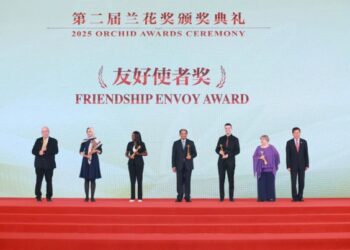The Chinese science fiction sector has experienced a fascinating evolution through decades.
A mechanical dragon is exposed during an exhibition on science fiction at the Shougang Park, in Beijing, on March 27, 2025.
In 1904, a Chinese novelist wrote the first original science fiction novel (SF) in the country. At the time, imagining a migration to the moon was pure fantasy. Who would have believed that a century later, the Chinese probe Chang’e-6 would make this trip to bring samples from the hidden side of our satellite? One hundred and twenty years later, China stands out as a major player in the world’s SF.
At the end of March, the 9th edition of the Conference on Science Fiction in China was held at the Beijing Shougang Park. On this occasion, the 2025 report of Chinese science fiction industry was published, showing that the production value amounted to 108.96 billion yuan last year. It was the second consecutive year that the sector crosses the 100 billion yuan mark, while in 2016, during the first census, it was barely 10 billion yuan.
A diversified creative landscape
Books, films, series, games, cultural tourism and derivative products constitute the key categories of the Chinese SF sector. But if we have to designate the largest winner, it would undoubtedly be the video games with 71.81 billion yuan in turnover in 2024, or 70 % of the total! This performance is explained by improving the quality of production, which boosts the income of games for PC and consoles.
The Chinese SF in literature has maintained stable growth since 2016, including rapid development of digital and audio books. Readers welcome the quality and originality of works, especially with regard to space-time explorations and visions of futuristic cities.
With the enormous success of The Wandering Earth, adapted from the eponymous novel by Liu Cixin, the cinema of Chinese SF has definitely took off. Since then, films like The Journey to the West and Evacuate from the 21st century have confirmed this trend, offering stories anchored in Chinese culture and philosophy – a refreshing alternative to the traditional codes of the Western SF. Television is not to be outdone: the adaptation of the famous The problem to three bodies has proven that the SF could also captivate the audiences of the small screen.
But futuristic imagination does not stop at screens! SF cultural tourism is developing at high speed with theme parks, immersive shows and role -playing games such as Murder Party. Among the most daring projects, the March camp, in the Lenghu desert (Qinghai). Since its opening in 2019, this site with Martian decor has already attracted millions of visitors looking for a change of scenery.

A child is wearing a VR helmet at the Science Fiction Conference of China 2025, in Beijing, March 29, 2025.
An intercultural bridge
Each medium brings its magic: literature takes the mind, cinema strikes the senses, video games plunge into action and cultural tourism makes the imagination tangible. “The SF sector is evolving towards a metavers where the real and the virtual mingle,” said Yidi, vice-president of the Perfect World group.
In addition, innovation clusters are training in cities like Beijing and Chengdu (Sichuan). The Chinese capital brings together nearly 800 SF companies, more than 200 of which are located in the Shougang Park, where five editions of the China Science Fiction Conference were held.
In October 2023, China welcomed the World Science Fiction Convention for the first time (WorldCon) in Chengdu. As the second Asian city to host this event, Chengdu has cultivated its craze for the SF since the 1970s with the journal Monde de la science fiction. In addition, since 2017, it has been transformed into a real “City of the SF” thanks to concrete initiatives.
The Chinese SF is expressed in a more and more diversified way on the international scene. Among the notable examples, we find the tour in Germany of an experimental play adapted from the novel Coming of the author of the author Chen Qiufan, the resounding success of the saga The Wandering Earth, as well as the announcement of a graphic adaptation of the problem with three bodies during the London Book Fair 2025.
In emerging markets, the popularity of the Chinese SF is experiencing a continuous ascent. According to the report on the communication of Chinese science fiction in the emerging overseas markets (2022-2024), countries such as Brazil, Argentina, Chile, Colombia and Peru display a significant increase in interest in the accounts from China.
The SF becomes a bridge between the imaginations of different cultures. Through her singular narrative form, she reinvents our vision of the future and technological and confronts imaginary to nourish intercultural dialogue. “Words on paper in the ramp fires, images with real performance, SF is not only a fictitious future, but also a language for cultural exchange,” said Chen.
Between past and future
Humanity has always dreamed of what seemed impossible. Today, submarines, satellite communications, humanoid robots materialized yesterday’s visions, while the Chinese SF continues to draw the contours of tomorrow. This creative abundance draws its roots from a millennial culture, like the legend of Kuafu pursuing the sun, the myth of Chang’e flying towards the moon, as well as the deep reflections of the poet that Yuan on nature and the universe in his work questions in heaven.
In recent years, the rapid development of science and technology has fueled the imagination of SF authors. Advanced in fields such as inhabited space flights, quantum communications and artificial intelligence serve as material for SF. According to Wang Jinkang, Chinese writer, SF and technological innovation form a double propeller, where technology nourishes the imaginary, which, in turn, inspires researchers.
In addition, the technological boom encourages everyone to rethink their relationship with the machine. “SF’s works offer a key to understanding China’s vision on the past and the future, on the universe and human beings,” analyzes JI Shaoting, founder and CEO of future Affairs Administration, a Chinese start-up that brings together many SF creators.
From the point of view of Wang Hongwei, secretary general of the association of directors of China, the film The Wandering Earth allowed filmmakers to think more deeply on the local values conveyed within this genre. “We are responsible for encouraging more people to think and be curious about the future,” he said. Chinese SF asserts itself as a vector of questions around the future, while used in a rich cultural tradition.








